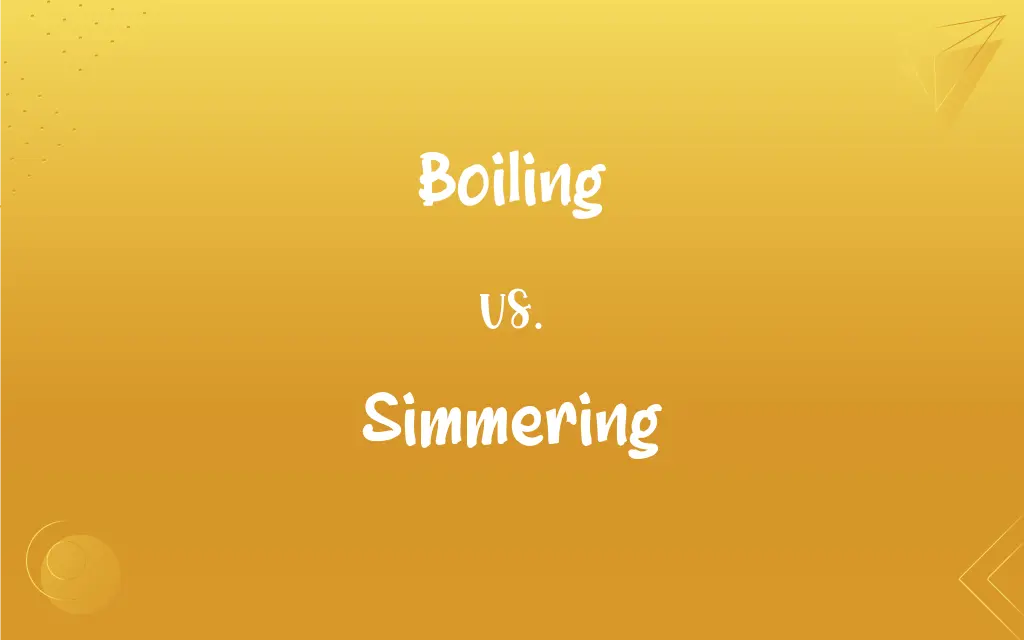Boiling vs. Simmering: What's the Difference?
Edited by Aimie Carlson || By Janet White || Published on January 30, 2024
Boiling is heating a liquid until it reaches a temperature where it bubbles and turns to vapor, while simmering is a gentler process where the liquid is kept just below the boiling point.

Key Differences
Boiling involves heating a liquid to 212°F (100°C), where it vigorously bubbles and steams. Simmering, in contrast, occurs at a lower temperature, typically between 180°F and 205°F (82°C - 96°C), where the liquid gently bubbles at the surface, providing a slower cooking process.
When boiling, the rapid movement of the liquid facilitates quick cooking and is ideal for pasta or sterilizing water. Simmering, with its subdued heat, is better suited for delicate foods like sauces or soups, preventing them from breaking down or burning.
Boiling is a vigorous and noisy process, easily observable by the rolling bubbles and steam. Simmering, however, is quieter and identified by small bubbles and less movement, perfect for extracting flavors without overcooking ingredients.
In boiling, the high temperature can cause some foods to fall apart or become tough. Simmering allows flavors to meld and ingredients to cook thoroughly without the harsh impact of boiling.
Boiling is typically a quick method, used in blanching or cooking foods that can withstand high heat. Simmering is a slower technique, ideal for stews, braises, and stocks, where flavors develop over time.
ADVERTISEMENT
Comparison Chart
Temperature
212°F (100°C)
180°F - 205°F (82°C - 96°C)
Bubble Activity
Vigorous, large bubbles
Gentle, small bubbles
Sound
Loud, rolling
Quiet, subtle
Ideal for
Quick cooking, pasta, sterilizing
Slow cooking, soups, sauces
Effect on Food
Quick, can toughen or break some foods
Gentle, preserves texture, enhances flavor
ADVERTISEMENT
Boiling and Simmering Definitions
Boiling
Reaching a point of extreme heat or excitement.
The crowd was boiling with enthusiasm.
Simmering
Cooking liquid at a temperature just below boiling, with gentle bubbles.
She's simmering the sauce to enhance its flavors.
Boiling
Rapidly heating a liquid to its boiling point, where it produces steam and bubbles.
I am boiling water for tea.
Simmering
A state of subdued or controlled activity or intensity.
The city was simmering with anticipation for the event.
Boiling
The process of a liquid turning into vapor when heated.
The boiling of the soup filled the room with aroma.
Simmering
Maintaining a liquid at a point where it is about to boil.
Simmering the stew slowly tenderizes the meat.
Boiling
Cooking food in boiling water or other liquids.
She's boiling eggs for breakfast.
Simmering
To keep a situation or emotion under control.
He was simmering with anger during the meeting.
Boiling
Sterilizing or cleansing something using boiling water.
Boiling the utensils kills germs.
Simmering
A method of cooking that uses low heat.
Simmering vegetables preserves their nutrients.
Boiling
Heated to or past the boiling point
A kettle of boiling water.
Simmering
To be cooked gently or remain just at or below the boiling point.
Boiling
Very angry or upset; seething.
Simmering
To be filled with pent-up emotion
Simmer with resentment.
Simmering
To be in a state of mild agitation or turmoil
Resentment simmering between rivals.
Simmering
To develop in a slow or unexcited way
She let the idea for the novel simmer.
Simmering
Present participle of simmer
Simmering
The act of something that simmers.
Simmering
Cooking in a boiling liquid
FAQs
What is simmering?
Simmering is cooking at a temperature just below boiling, with gentle bubbles.
Can boiling affect food texture?
Yes, boiling can sometimes make foods tough or cause them to fall apart.
When should I use boiling?
Use boiling for quick cooking, like pasta, or sterilizing water.
What is boiling?
Boiling is heating a liquid to 212°F (100°C), where it vigorously bubbles and turns to vapor.
Can I simmer in any pot?
Yes, but heavy-bottomed pots are best for even heat distribution.
Does altitude affect boiling and simmering?
Yes, at higher altitudes, both processes occur at lower temperatures.
When is simmering preferable?
Simmering is ideal for soups, stews, and sauces where gentle cooking is needed.
Can I boil or simmer without a lid?
Yes, but a lid helps maintain temperature and speeds up the process.
Can boiling water exceed 212°F (100°C)?
Under normal conditions, water cannot exceed its boiling point.
How do I know if a liquid is simmering?
Look for small, gentle bubbles and less vigorous movement than boiling.
What's the difference in energy use between boiling and simmering?
Boiling uses more energy due to higher temperature and shorter cooking time.
What foods should not be boiled?
Delicate foods like leafy vegetables or fish, as they can disintegrate.
Is simmering better for flavor development?
Yes, simmering allows flavors to develop and meld together without overcooking.
Can simmering cause food to overcook?
Yes, if simmered too long, even at low temperatures.
How do I control the simmering temperature?
Adjust the heat and watch the bubble activity to maintain a steady simmer.
Is there a health difference between boiling and simmering foods?
Simmering can better preserve some nutrients than boiling.
Is simmering the same as slow cooking?
Simmering is a form of slow cooking, but typically done on a stovetop.
Can I boil and simmer in a microwave?
Boiling is possible, but simmering is challenging due to uneven heat.
How do I adjust boiling or simmering on an electric stove?
Adjust the heat setting: higher for boiling, lower for simmering.
Is it safe to leave something simmering unattended?
It's not recommended, as there's a risk of boiling over or burning.
About Author
Written by
Janet WhiteJanet White has been an esteemed writer and blogger for Difference Wiki. Holding a Master's degree in Science and Medical Journalism from the prestigious Boston University, she has consistently demonstrated her expertise and passion for her field. When she's not immersed in her work, Janet relishes her time exercising, delving into a good book, and cherishing moments with friends and family.
Edited by
Aimie CarlsonAimie Carlson, holding a master's degree in English literature, is a fervent English language enthusiast. She lends her writing talents to Difference Wiki, a prominent website that specializes in comparisons, offering readers insightful analyses that both captivate and inform.































































